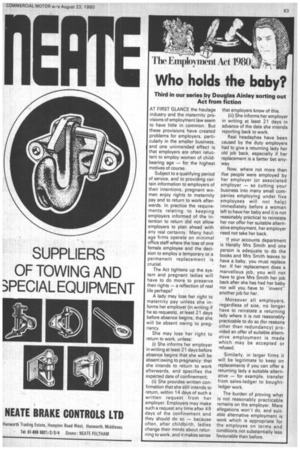Who holds the baby?
Page 65

If you've noticed an error in this article please click here to report it so we can fix it.
Third in our series by Douglas Ainley sorting out Act from fiction
AT FIRST GLANCE the haulage industry and the maternity provisions of employment law seem to have little in common. But these provisions have created problems for employers, particularly in the smaller business, and one unintended effect is that employers are often reluctant to employ women of childbearing age — for the highest motives of course.
Subject to a qualifying period of service, and to providing certain information to employers of their intentions, pregnant women enjoy rights to maternity pay and to return to work afterwards. In practice the requirements relating to keeping employers informed of the intention to return did not allow employers to plan ahead with any real certainty. Many haulage firms operate on minimal office staff where the loss of one female employee and the decision to employ a temporary or a permanent replacement is crucial, The Act tightens up the system and pregnant ladies will have to do more to preserve their rights — a reflection of real life perhaps?
A lady may lose her right to maternity pay unless she informs her employer (in writing if he so requests), at least 21 days before absence begins, that she will be absent owing to pregnancy.
She may lose her right to return to work, unless: (i) She informs her employer in writing at least 21 days before absence begins that she will be absent owing to pregnancy: that she intends to return to work afterwards, and specifies the expected date of confinement; (ii) She provides written confirmation that she still intends to return, within 14 days of such a written request from her employer. Employers may make such a request any time after 49 days of the confinement and they should do so — because often, after childbirth, ladies change their minds about returning to work, and it makes sense that employers know of this.
(iii) She informs her employer in writing at least 21 days in advance of the date she intends reporting back to work.
Real headaches have been caused by the duty employers had to give a returning lady her old job back, especially if her replacement is a better bet anyway.
Now, where not more than five people were employed by her employer (or associated employer — so cutting your business into many small companies employing under five employees will not help) immediately before a woman left to have her baby and it is not reasonably practical to reinstate her nor offer her suitable alternative employment, her employer need not take her back.
If your accounts department is literally Mrs Smith and one person is adequate to do the books and Mrs Smith leaves to have a baby, you must replace her. If her replacement does a marvellous job, you will not have to give Mrs Smith her job back after she has had her baby nor will you have to "invent" another job for her.
Moreover all employers, regardless of size, no longer have to reinstate a returning lady where it is not reasonably practicable to do so (for reasons other than redundancy) provided an offer of suitable alternative employment is made which may be accepted or refused_ Similarly, in larger firms it will be legitimate to keep on replacements if you can offer a returning lady a suitable alternative — for example, transfer from sales-ledger to boughtledger work.
The burden of proving what is not reasonably practicable remains on the employer. Mere allegations won't do, and suitable alternative employment is work which is appropriate for the employee on terms and conditions not substantially less favourable than before.




















































































































